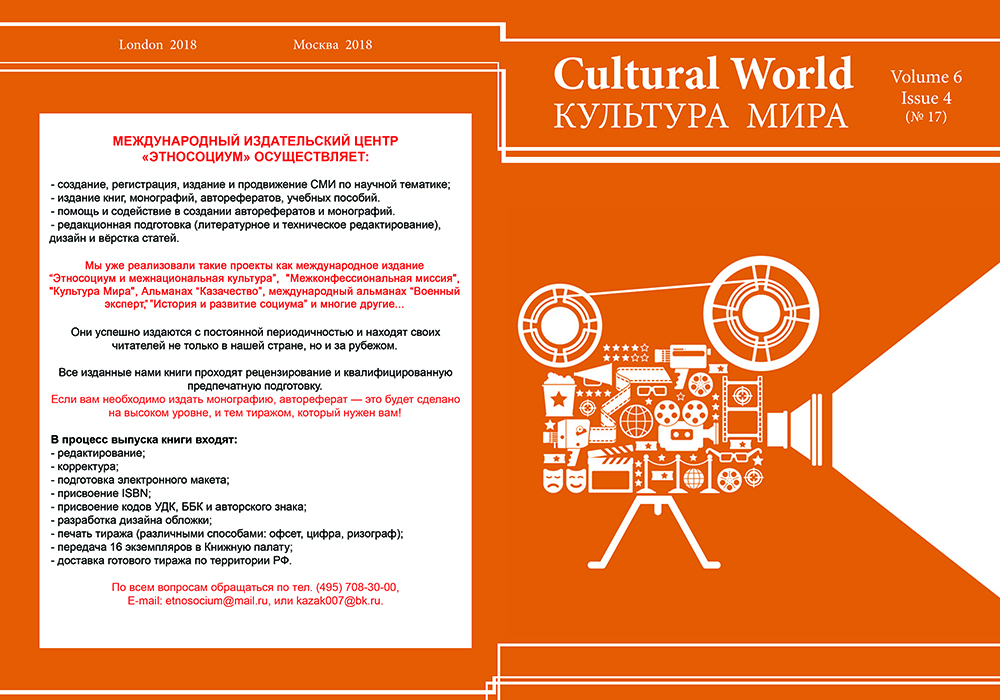
Volume 6. Issue 4. (№ 17)
The Council of Reviewers of the publishing house together with the teaching staff of leading universities:
The main criteria of our choosing materials for publishing is their high scientific level. The main principle of the publishing house is to accept pluralism of views if authors present their points of view in a well-argued manner. The author’s view point does not have to coincide with the editors’ view points.
The authors of submitted materials are responsible for the accuracy of facts, quotations, dates, events, geographical and proper names.
If you use any materials from the journal, you are to give a relevant reference to it.
All the submitted materials are reviewed.
Contents
|
Social projects and information technologies
|
|
|
Murashko S.F., Rudakova S.V. Situational teaching and learning approach
|
308
|
|
UNESCO: culture and national traditions
|
|
|
Ternovaya L.O. The influence of the characters of fictional worlds on geopolitical reality
|
316
|
|
Khachapuridze R.Ya. Magic and religious remedies (according to Lechkhum ethnographic materials)
|
329
|
|
The first Turkish-Russian festival of classical music in Antalya
|
346
|
|
The best illustrator of Andersen. About artist Boris Diodorov
|
350
|
|
Objects of cultural heritage
|
362
|
|
Geopolitics, human rights
|
|
|
Xie Yiping China's participation in the development of the SCO
|
366
|
|
Abstracts
|
379
|
|
Authors
|
381
|
Abstracts
Murashko S.F.
Rudakova S.V.
Situational teaching and learning approach
The article is devoted to the analysis of the situational approach in teaching and learning of students. It is devoted to the analysis of contextual approach in the process of teaching students. The article reflects the main approaches, methods and principles of preparing students to real life using their experience and acquired knowledge.
Key words: situational approach, the principle of interdependence, the principle of differentiation, the principle of self-regulation, behaviorism and constructivism in education.
Ternovaya L.O.
The influence of the characters of fictional worlds on geopolitical reality
During the complicated geopolitical times people used to seek an explanation for the difficulties not only in the objective reality, but also in mythical constructions. In this they are assisted by numerous representatives of the lowest mythology. Images of the characters of fictional worlds actively invade the political symbolism. Its requires an analysis of their specific features and reasons of conservation influence on people's minds.
Key words: mythology, geopolitics, imaginary worlds, the political symbolism.
Xie Yiping
China's participation in the development of the SCO
The emergence of the Shanghai Cooperation Organization (SCO) in the international arena in 2001 was caused by a combination of various factors (political, economic, theoretical, historical, diplomatic, cultural), chief among which are: the improvement of relations between the Russian Federation and the PRC in the early 90s the years of the twentieth century and the desire of both states to settle border issues, the collapse of the Soviet Union, the creation of a New World Order, where a unipolar system of international relations took shape. The USA became the only superpower, and the post-Soviet space, including the region of Central Asia, was included in the sphere of Washington’s interests; weakening the legitimacy of existing international law, including the principle of sovereignty and the inviolability of borders; the emergence of new challenges and threats, such as terrorism, separatism and extremism, that threaten Russia, China and the Central Asian states at the turn of the 21st century; protection of the Russian Federation and the People's Republic of China of the principles of a multipolar world and a more equitable world order; political responsibility of the Russian Federation and the People's Republic of China for preserving security and stability in the Eurasian space together with the independent states of the Central Asian region.
Key words: SCO, Shanghai Five, PRC, RF, cooperation, expansion, security, fight against terror.
Authors
Khachapuridze R.Ya., Professor. Kutaisi, Akaki Tsereteli State University, Department of History and Archeology. Georgia.
Murashko S.F., Candidate of Psychology, Professor of the Department of Russian and Foreign Languages. Moscow Academy of Investigation Committee.
Rudakova S.V., Candidate of Psychological Sciences, Associate Professor of the Department of Russian and Foreign Languages. Moscow Academy of Investigation Committee.
Ternovaya L.O., Doctor of Historical Sciences, Professor MADI (The Moscow Automobile and Road Construction University).
Xie Yiping, Applicant at the Department of Theory and History of International Relations Peoples' Friendship University of Russia.

